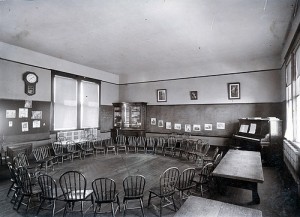Year in review: Public history scholarship on History@Work
12 August 2013 – editors

Kindergarten classroom in Lethbridge, Alberta, 1907-1912 (Source: Galt Museum and Archives)
Another academic year is approaching, perhaps more quickly than some of us might like. So it seems like a good time to look back at how scholarship in (and about) public history has been reflected in this blog over the past 12 months. Here are some of the connections and themes that emerge when we click on the “scholarship” tag in the blog.
Public and academic history
- What “counts” as a public history dissertation? Some views from the field – Richard Anderson (Aug. 10, 2012)
- Help wanted: Thoughts on the recent boom in academic public history jobs – Lara Kelland and Anne Parsons (Sept. 17, 2012)
- Public history’s surprising roots – Denise Meringolo (March 6, 2013)
- Embargoing digital dissertations: A round-up of the discussion so far – Rebecca Shrum (July 25, 2013)
- Where is the next generation of gender studies in public history? – Cathy Stanton (Aug. 9, 2013)
The Public Historian journal
- The tag “The Public Historian” will take you to posts about the field’s flagship journal (for example, the series of posts about the results of the 2012 NCPH Readers Survey) as well as materials published by the journal here in the Public History Commons (such as the conference city reviews preceding and following the 2013 National Council on Public History meeting in Ottawa).
Scholarship in public history consulting
- Christopher Clarke’s “Mind in the Marketplace” series on surviving as an independent public history consultant (Fall 2012)
- Independent research for the independent consultant, Part I, “Making time,” and Part II, “Making your clients’ interests your research interests” – Michael Adamson (Sept. 19 and Oct. 1, 2012)
- Unfamiliar terrain: Reevaluating a landmark’s past, Part I and Part II – Joseph Cialdella (Dec. 18 and Dec. 24, 2012)
- What ethnography brings to public history – Cathy Stanton (April 2, 2013)
- Russell Lee in the Northwest: Documenting Japanese American Labor Camps in Oregon and Idaho – Morgen Young (June 26, 2013)
Scholarship in training and teaching
- Fail better? Failure and public history – Modupe Labode (Sept. 24, 2012)
- “Make it so,” but how? Best practices for new public history programs – Larry Cebula (Feb. 11, 2013)
- What employers seek in public history graduates (Part 4) – Alexandra Mosquin (March 11, 2013)
- Learning from community – Ellen Kuhn, Shawna Prather, and Ashley Wyatt (April 10, 2013)
“Imperiled Promise: The State of History in the National Park Service” study
- Refining the republic: A discussion on history in the National Park Service – Melinda Jette (Nov. 8, 2012)
- Two posts by Marla Miller and Anne Mitchell Whisnant – What next for Imperiled Promise? and Synergies and cross-purposes (April 3 and 4, 2013)
Digital public history scholarship
- The short, intriguing career of Public History Ryan Gosling – Annie Cullen and Rachel Boyle (Oct. 3, 2012)
- Every tool is a weapon: Why the digital humanities movement needs public history – Mary Rizzo (Nov. 2, 2012)
- Subjecting History: Launching a digital open review process – Zachary McKiernan (March 13, 2013)
Issues in public history scholarship
- Serving two masters: Questions of audience at the Joseph Smith Documentary Editing Project, Part I, Part II, and Part III – Matthew Godfrey (Nov. 19 and 26 and Dec. 4, 2012)
- When opportunity knocks – John Dichtl (Jan. 14, 2013)
- Peer review in a world of professional practice – Adina Langer and Cathy Stanton (Feb. 22, 2013)
Activist scholarship
- The Ruskin College records: Destroying a radical past – Hilda Kean (Nov. 28, 2012)
- The happy historian: Degrees of history – Zachary McKiernan (Jan. 4 , 2013)
General/think pieces
- Writing locally, thinking globally – Robert Weyeneth (Jan. 9, 2013)
- In search of public history’s “threshold concepts” – Randy Bergstrom and John Majewski (Feb. 20, 2013)
- Mormons and midwives, or A tale of two shuttle rides – Cathy Stanton (Oct. 10, 2012)




I just read this summary as I was preparing for my Public History class tomorrow night (I’ve asked them to spot around in History@Work for articles that interest them). Thanks to the editors for assembling this helpful summary, which led me back to some earlier posts and discussions that I had missed over the course of the year (like the terrific post and commentary on “best practices for new public history programs”). Although I’m not trying to start a new public history program, I found the discussion on that post very valuable in thinking about why I’m teaching a public history *course*. Anyway, that’s just an example of a great gem that I discovered thanks to this “year in review.” I hope the editors make this a regular feature!